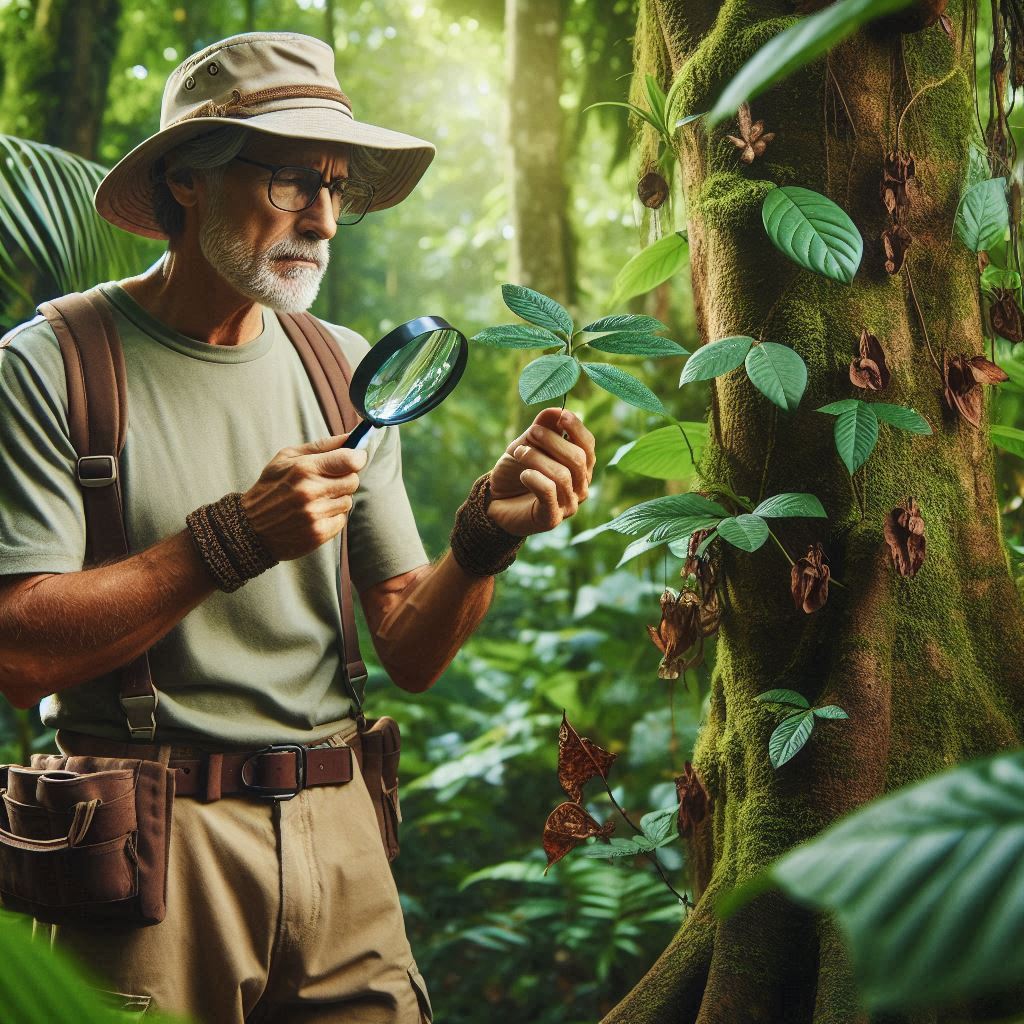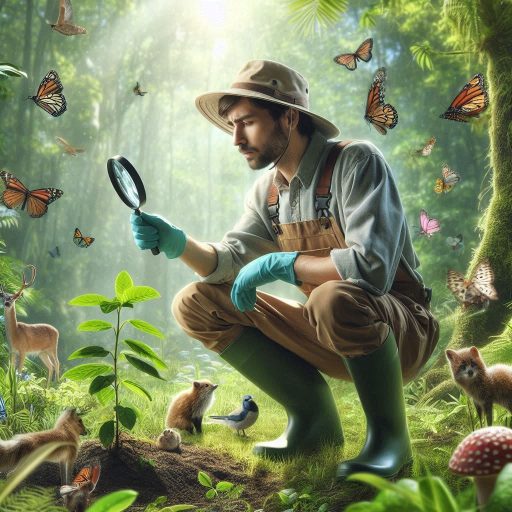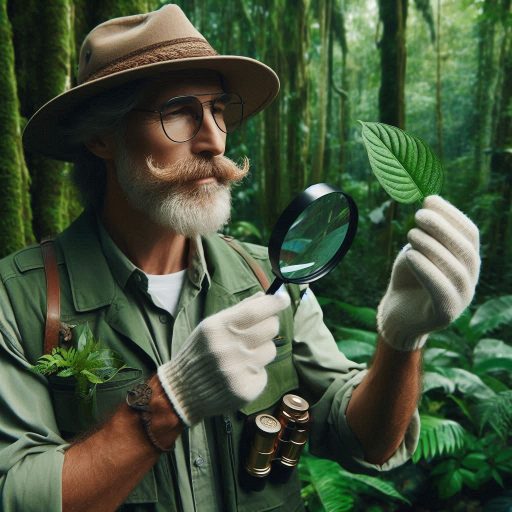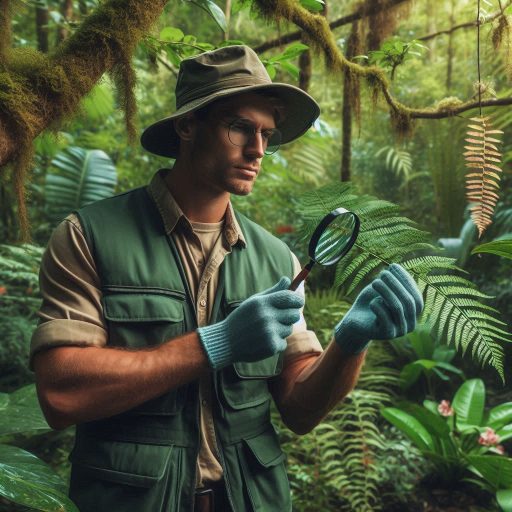Introduction
Ecology is the scientific study of how living organisms interact with each other and their physical environment.
This field encompasses the relationships between species, ecosystems, and environmental processes.
Ecologists work to understand the complexities of these interactions and how they shape the world around us.
Their research plays a vital role in addressing environmental challenges such as climate change, habitat destruction, and biodiversity loss.
Education is critical for aspiring ecologists to build a strong foundation of knowledge and develop the necessary skills for success.
A solid educational background prepares individuals to understand ecosystems, conduct research, and apply their findings to conservation efforts.
Without proper education, aspiring ecologists would lack the tools to analyze data, evaluate environmental issues, or implement effective solutions for preserving natural ecosystems.
The essential education paths for aspiring ecologists begin with a bachelor‘s degree.
Typically, students major in biology, ecology, environmental science, or a related field.
This undergraduate education introduces students to core topics such as organismal biology, ecosystem dynamics, and environmental principles.
Alongside coursework, students often gain hands-on experience through laboratory sessions and fieldwork.
Field studies are crucial for ecologists, as they help students develop skills in data collection, species identification, and ecological sampling techniques.
Bachelor’s Degree in Ecology or Related Field
Obtaining a Bachelor’s degree in Ecology or a related field is the first step towards becoming an ecologist.
This undergraduate program provides students with a solid foundation in ecological principles and prepares them for further specialization in the field.
Description of Typical Coursework in a Bachelor’s Program
- Introductory Biology: Students are introduced to foundational concepts in biology, including cell biology, genetics, and evolution.
- Ecology and Environmental Science: Courses cover topics such as ecosystem dynamics, biodiversity, and conservation biology.
- Statistics: Knowledge of statistical methods is essential for data analysis in ecological research.
- Field Research Methods: Students learn how to conduct field studies, collect data, and analyze results.
- Botany and Zoology: Understanding plant and animal biology is crucial for studying ecosystems.
These courses provide a comprehensive overview of ecological principles, helping students develop a strong scientific background and research skills.
Importance of Gaining a Broad Understanding of Ecological Principles
Ecology is a multidisciplinary field that examines the interactions between organisms and their environment.
A broad understanding of ecological principles is essential for ecologists to address complex environmental challenges effectively.
By studying a wide range of topics in ecology, students gain insights into the interconnectedness of living organisms and ecosystems.
This knowledge allows them to analyze ecological systems holistically and propose solutions that promote environmental sustainability.
Ecologists gain valuable knowledge and skills by understanding ecological principles, enabling them to collaborate with experts in various disciplines.
They work closely with professionals in environmental science, conservation biology, and climate science to address complex environmental issues.
This broad expertise fosters effective teamwork and multidisciplinary solutions for ecological challenges.
This interdisciplinary approach is crucial for addressing pressing environmental issues and promoting biodiversity conservation.
Advantages of Specializing in a Specific Area of Ecology
While gaining a broad understanding of ecological principles is important, specializing in a specific area of ecology can provide ecologists with in-depth knowledge and expertise in a particular field.
Specialization allows ecologists to focus their research efforts on specific topics of interest and contribute significantly to the advancement of ecological science.
Some areas of specialization in ecology include
- Population Ecology: Studying the dynamics of populations and factors influencing population growth and decline.
- Community Ecology: Analyzing interactions between different species within a community and their effects on ecosystem structure and function.
- Conservation Biology: Focusing on the preservation and management of biodiversity and endangered species.
- Restoration Ecology: Restoring degraded ecosystems and habitats to their natural state through conservation and rehabilitation efforts.
By specializing in a specific area of ecology, ecologists can deepen their understanding of complex ecological processes and contribute valuable insights to research, conservation, and environmental management initiatives.
Aspiring ecologists should pursue a bachelor‘s degree in ecology or a related field.
This education provides a broad understanding of ecological principles.
Specializing in a specific area of ecology further enhances their expertise.
By acquiring the necessary knowledge and expertise, ecologists can make meaningful contributions to environmental conservation and sustainability efforts.
Read: Continuous Learning: Post-graduate Options for US Biologists
Internships and Field Experience
Internships and field experience are essential components for aspiring ecologists to gain practical skills and hands-on experience in the field.
Here, we will discuss the importance of gaining hands-on experience, overview opportunities for internships and field research, and ways to network effectively.
Importance of Gaining Hands-on Experience in the Field
Ecology is a field that requires practical skills and hands-on experience.
By gaining field experience, aspiring ecologists can apply theoretical knowledge to real-world situations, develop problem-solving skills, and enhance their understanding of ecological processes.
Field experience also allows individuals to work with diverse ecosystems and species, improving their ability to adapt to different environments and challenges.
Overview of Opportunities for Internships and Field Research
There are numerous opportunities for internships and field research in ecology.
Many organizations, research institutions, government agencies, and non-profit organizations offer internships and research positions for individuals interested in gaining hands-on experience in the field.
These opportunities provide valuable learning experiences, mentorship from experienced professionals, and exposure to cutting-edge research in ecology.
Check with local universities, research institutions, and ecological organizations for available positions.
Check with local universities, research institutions, and ecological organizations for available positions.
Utilize online platforms such as job boards, internship databases, and professional networking sites to search for opportunities.
Ways to Network and Gain Practical Skills in Ecology
Networking is a crucial aspect of building a successful career in ecology.
By connecting with professionals in the field, aspiring ecologists can gain valuable insights, mentorship, and opportunities for internships and field research.
Networking also helps individuals expand their professional circle, learn about job openings, and stay informed about the latest trends and developments in ecology
Attend ecology conferences, workshops, and seminars to meet professionals and experts in the field.
Join ecological societies, organizations, and online forums to connect with like-minded individuals and stay updated on industry news.
Transform Your Career Today
Unlock a personalized career strategy that drives real results. Get tailored advice and a roadmap designed just for you.
Start NowParticipate in volunteer opportunities, community projects, and field trips to gain practical skills and experience in ecology.
Therefore, internships and field experience are vital for aspiring ecologists to gain practical skills, hands-on experience, and networking opportunities in the field.
By actively seeking internships, conducting field research, and networking with professionals, individuals can enhance their knowledge, skills, and career prospects in ecology.
Read: The Impact of Technology on the Chemist Profession in the US
Graduate Degree Options
Description of Master’s and Doctoral Programs in Ecology
Earning a graduate degree in ecology is crucial for aspiring ecologists who want to advance their careers.
Master’s programs typically focus on developing research and analytical skills, while doctoral programs delve deeper into specialized areas of study within ecology.
Master’s programs provide students with a solid foundation in ecological principles and techniques.
They often include coursework in topics such as population dynamics, conservation biology, and ecosystem management.
These programs also emphasize fieldwork and hands-on research experiences to prepare students for careers in academia, government agencies, consulting firms, and non-profit organizations.
On the other hand, doctoral programs offer a more intensive and specialized education in ecology.
Students in these programs engage in advanced coursework, independent research projects, and collaborations with faculty mentors.
They are expected to contribute original research to the field and make significant advancements in their chosen area of specialization.
Benefits of Pursuing Advanced Degrees for Career Advancement
Obtaining a master’s or doctoral degree in ecology can open up a wide range of career opportunities for aspiring ecologists.
Advanced degrees are highly valued by employers in the environmental science and conservation fields, as they demonstrate a commitment to academic excellence and expertise in ecological research.
Graduate degree holders often have a competitive edge in the job market and are eligible for higher-paying positions with greater responsibility and leadership opportunities.
Advanced degrees also provide ecologists with the skills and knowledge necessary to tackle complex environmental challenges and contribute to the advancement of scientific knowledge in the field.
Furthermore, pursuing an advanced degree can enhance an ecologist’s professional network and open doors to collaborations with other experts in the field.
Graduate programs offer opportunities for students to engage with renowned researchers, attend conferences, and participate in interdisciplinary projects.
It lead to career advancement and recognition within the scientific community.
Discussion of Research Opportunities and Specialization in a Particular Area of Ecology
Both master’s and doctoral programs in ecology offer students the chance to specialize in a particular area of interest within the field.
Research opportunities abound in areas such as wildlife ecology, conservation biology, ecosystem ecology, environmental toxicology, and climate change.
Students in graduate programs can work closely with faculty advisors to design research projects that align with their interests and career goals.
They may conduct fieldwork, laboratory experiments, data analysis, and modeling studies to address pressing environmental issues and contribute to the body of scientific knowledge in their chosen area of specialization.
Specializing in a particular area of ecology allows students to develop expertise and become leaders in their field.
Employers and research institutions seek graduates with specialized knowledge and skills to address specific ecological challenges.
These graduates make meaningful contributions to environmental conservation and sustainability efforts.
Read: US Chemistry Conferences and Symposiums to Attend in 2024

Certification and Licensure
Explanation of Certifications That May Be Beneficial for Ecologists
Certifications play a crucial role in an ecologist‘s career, demonstrating expertise and enhancing credibility.
One valuable certification is the Certified Ecologist credential, offered by the Ecological Society of America (ESA).
This certification showcases your skills and knowledge in ecological practices, making you a more competitive candidate.
Another important certification is the Professional Wetland Scientist (PWS), awarded by the Society of Wetland Scientists.
This credential is ideal for ecologists working in wetland ecosystems, demonstrating specialized knowledge in wetland research and management.
The PWS certification is highly respected in industries dealing with environmental assessments and wetland conservation projects.
Additional certifications in Geographic Information Systems (GIS) are also beneficial for ecologists.
Proficiency in GIS software enables ecologists to analyze spatial data and interpret environmental patterns.
Employers in consulting firms and government agencies often prioritize candidates with GIS certifications.
Obtaining these certifications demonstrates your dedication to the field and equips you with essential tools for professional success.
It is important to research the specific certifications that align with your ecological focus to maximize career opportunities.
Importance of Obtaining Necessary Licenses for Certain Positions
In some states, obtaining the necessary licenses is mandatory for certain ecological roles.
For instance, ecologists who specialize in environmental impact assessments may need state-issued permits to conduct their work legally.
These licenses ensure that ecologists meet local environmental standards and regulations, particularly when working on conservation or land management projects.
In states like California and Florida, professionals working with protected species or sensitive habitats often need special permits.
These permits allow ecologists to conduct research or manage species in compliance with state and federal laws.
Licensing requirements vary, so it‘s crucial to understand the regulations specific to your geographic area and specialization.
Additionally, ecologists involved in environmental consulting or habitat restoration may need licenses related to hazardous waste management or water quality assessments.
Licensing in these areas verifies that ecologists adhere to safety and environmental regulations.
Licenses not only ensure compliance with legal standards but also increase job prospects, as many employers prefer candidates with the appropriate credentials.
Overview of Professional Organizations That Offer Certifications in Ecology
Several professional organizations offer certifications that are invaluable for ecologists.
The Ecological Society of America (ESA) is one of the leading organizations, offering the Certified Ecologist credential.
ESA also provides networking opportunities and resources for continuing education, helping members stay current with ecological research.
The Society of Wetland Scientists offers the Professional Wetland Scientist (PWS) certification, highly regarded in wetland research and management.
This certification is crucial for ecologists who specialize in wetlands or aquatic ecosystems.
Joining these organizations allows ecologists to access valuable resources, professional development programs, and job listings.
Membership often includes opportunities for mentorship and collaboration, essential for career growth.
In essence, aspiring ecologists benefit from obtaining certifications, licenses, and professional memberships.
These credentials enhance credibility, increase job prospects, and provide ongoing professional support.
Read: Key Roles and Responsibilities of a Chemist in the US
Continuing Education and Professional Development
As an aspiring ecologist, it is crucial to prioritize continuing education and professional development to stay current with advancements in the field.
This will not only enhance your knowledge and skills but also improve your career prospects.
Importance of Staying Current
Ecology is a rapidly evolving field with new technologies, research findings, and methodologies emerging constantly.
By staying current, you can adapt to these changes, utilize innovative approaches, and contribute effectively to environmental conservation and sustainable practices.
Ways to Continue Learning and Growing
- Enroll in advanced degree programs: Pursuing a Master’s or Ph.D. in Ecology or related fields can deepen your expertise and open up opportunities for research and leadership roles.
- Attend workshops and seminars: Participating in specialized workshops and seminars can provide hands-on training, networking opportunities, and exposure to cutting-edge research.
- Join professional organizations: Membership in ecological societies and associations can offer access to resources, publications, and conferences that promote continuous learning and collaboration.
- Seek mentorship: Establishing mentor-mentee relationships with experienced ecologists can provide guidance, support, and valuable insights for professional growth.
- Participate in fieldwork and internships: Hands-on experience in real-world ecological projects can enhance your practical skills, field knowledge, and problem-solving abilities.
- Engage in online courses: Taking online courses on ecological topics can broaden your understanding, update your skills, and accommodate your schedule flexibility.
- Conduct research and publish papers: Contributing to research projects, publishing scientific papers, and presenting at conferences can showcase your expertise and contribute to the scientific community.
Resources for Professional Development Opportunities
There are various resources available for finding workshops, conferences, and other professional development opportunities in the field of ecology
- Ecological societies and associations: Organizations like the Ecological Society of America, Society for Conservation Biology, and Association for Tropical Biology and Conservation regularly host conferences, workshops, and webinars.
- Academic institutions: Universities and research institutions often organize seminars, symposiums, and training programs that are open to students, researchers, and professionals in the ecological field.
- Online platforms: Websites such as Coursera, edX, and Udemy offer a wide range of online courses related to ecology, biodiversity, conservation, and environmental science.
- Professional networking: Building connections with fellow ecologists, researchers, and practitioners can lead to collaborations, job opportunities, and access to professional development events.
- Government agencies and NGOs: Environmental agencies, conservation organizations, and non-governmental organizations frequently organize workshops, training sessions, and conferences on ecological topics.
- Scientific journals and publications: Subscribing to scientific journals, magazines, and newsletters can keep you informed about the latest research findings, funding opportunities, and upcoming events in ecology.
By actively engaging in continuing education and professional development activities, aspiring ecologists can cultivate their skills, expand their knowledge base, and contribute meaningfully to the field of ecology.
See Related Content: Nanotechnologist: Balancing Lab Work and Field Work
See Related Content: The Role of Data Scientists in Healthcare
Networking and Building Relationships
Essential Education Paths for Aspiring Ecologists
Aspiring ecologists must not only gain the right academic background but also connect with other professionals in the field.
Building relationships early in your career is vital for long-term success.
Networking helps you gain valuable insights, share knowledge, and open doors to potential job opportunities.
Engaging with other professionals allows you to stay updated on the latest trends and research developments in ecology.
Connecting with established ecologists can provide guidance, mentorship, and feedback that accelerate your career.
Professionals often share advice on overcoming common challenges, such as securing research funding or navigating complex projects.
Networking also helps you tap into hidden job markets, where positions are filled through referrals rather than job boards.
Overview of Networking Opportunities for Aspiring Ecologists
There are numerous networking opportunities for aspiring ecologists.
One of the most effective methods is attending conferences and workshops.
Events such as the Ecological Society of America (ESA) Annual Meeting bring together professionals from diverse subfields.
These gatherings provide a platform to present your research, meet industry leaders, and exchange ideas.
Conferences also give you direct access to experts who can become potential collaborators or mentors.
Universities and professional organizations often host networking events, seminars, and discussion panels that cater to ecology students.
Participating in these activities helps you build a network of like-minded individuals with similar goals.
You can also join online communities dedicated to ecology.
Platforms like LinkedIn, ResearchGate, and even Twitter serve as spaces for ecologists to share articles, discuss topics, and connect with peers globally.
Volunteering with ecological projects or nonprofit organizations is another way to expand your network.
Many successful ecologists started by working on field projects or internships.
Volunteering provides you with hands-on experience and the chance to meet influential people in the field.
Networking in these environments often leads to more significant opportunities later in your career.
Tips for Building Relationships and Collaborating with Colleagues in Ecology
Building relationships and collaborating with colleagues are essential for success in ecology.
Start by engaging genuinely with peers and mentors.
Show interest in their work and ask thoughtful questions.
A strong professional relationship is based on trust, open communication, and mutual respect.
Follow up on conversations after networking events by connecting on LinkedIn or email to continue building rapport.
Collaborating on projects or papers is a practical way to develop long-term relationships in ecology.
When you work together, you share knowledge and develop a deeper understanding of complex ecological challenges.
Successful collaborations often lead to future research opportunities and a broader professional network.
Be proactive in maintaining relationships.
Reach out periodically to share updates about your work or ask for advice.
Attending professional events regularly will keep your network engaged and help you stay top of mind for potential collaborations.
Transform Your Career Today
Unlock a personalized career strategy that drives real results. Get tailored advice and a roadmap designed just for you.
Start NowIn review, aspiring ecologists need to connect with professionals, seize networking opportunities, and build meaningful relationships.
This approach will enhance your career prospects and foster collaborative research opportunities.
A strong network opens the door to valuable mentorships, collaborations, and career advancements in the field of ecology.
Conclusion
In this blog post, we explored the essential education paths for aspiring ecologists.
A bachelor‘s degree in ecology, environmental science, or a related discipline is the starting point for building a strong foundation in ecological principles.
During undergraduate studies, aspiring ecologists should focus on courses like biology, chemistry, and environmental policy to gain a well-rounded understanding of ecosystems and environmental challenges.
Practical experience, such as internships or fieldwork, is also crucial to applying classroom knowledge to real-world situations.
For those looking to advance in research, academic, or specialized roles, pursuing a master’s or PhD is highly recommended.
Graduate studies allow ecologists to dive deeper into specific areas like conservation biology, climate change, or habitat restoration.
This advanced education can open doors to leadership positions, academic careers, or government and NGO roles focused on environmental policy.
A career in ecology is an opportunity to make a profound difference in environmental conservation and sustainability.
With global ecosystems facing increasing pressures from climate change, pollution, and habitat loss, the work of ecologists is more important than ever.
Aspiring ecologists should be passionate about solving these challenges, understanding ecosystems, and developing sustainable solutions to protect our planet.




